Kenneth L. Gentry Jr.'s Blog, page 97
July 19, 2016
THE MILLENNIAL MAZE
 PMT 2016-052 by Keith Mathison (Ligonier)
PMT 2016-052 by Keith Mathison (Ligonier)
I once heard someone define the millennium as a thousand-year period of time during which Christians fight over the proper interpretation of the book of Revelation. While amusing, that definition is obviously incorrect. Christians have been fighting over the proper interpretation of the book of Revelation for two thousand years. In all seriousness, however, all of the fighting has led some Christians to adopt despairingly a position they call panmillennialism (we don’t know which view of the millennium is correct, but we know it will all pan out in the end).
The word millennium refers to the “thousand years” mentioned in Revelation 20. Because this chapter is found in one of the most difficult books of the New Testament, its proper interpretation is disputed. As a result, there are four main views of the millennium held within the church today: historic premillennialism, dispensational premillennialism, amillennialism, and postmillennialism.
The prefixes pre- and post- before the word millennium have to do with the timing of the second coming of Christ in relationship to the millennium itself. The term premillennialism refers to the belief that the Second Coming will occur before the millennium. The term postmillennialism refers to the belief that the second coming will occur after the millennium. Strictly speaking, amillennialism is a version of postmillennialism in this sense because amillennialists believe Christ’s second coming will occur after the millennium. There are other differences that distinguish amillennialists from postmillennialists. An understanding of what proponents of each of these views have taught historically provides a helpful context for current discussions of Revelation 20.
Historic Premillennialism
Historic premillennialism teaches that at the end of the present age, there will be the great tribulation followed by the second coming of Christ. At Christ’s coming, the Antichrist will be judged, the righteous will be resurrected, Satan will be bound, and Christ will establish His reign on earth, which will last for a thousand years and be a time of unprecedented blessing for the church. At the end of the millennium, Satan will be released and he will instigate a rebellion, which will be quickly crushed. The unrighteous will at this point be raised for judgment, after which the eternal state will begin.
When Shall These Things Be? A Reformed Response to Hyperpreterism
(ed. by Keith Mathison)
A reformed response to the aberrant HyperPreterist theolgy.
Gentry’s chapter critiques HyperPreterism from an historical and creedal perspective.
See more study materials at: www.KennethGentry.com
Historic premillennialism has had its proponents in the church from at least the second century AD onward. It was taught, for example, by Irenaeus (140- 203) and Justin Martyr (100-165), and may have been taught in the late first century by Papias (80-155). Some within the Reformed tradition, such as James Montgomery Boice, have taught this view. The most notable proponent of historic premillennialism in the twentieth century was George Eldon Ladd, whose commentary on the book of Revelation argues strongly for this position.
Dispensational Premillennialism
Dispensational premillennialism offers the most complex chronology of the end times. According to dispensationalism, the current church age will end with the rapture of the church, which, along with the appearance of the Antichrist, marks the beginning of the seven-year great tribulation on earth. The tribulation will end with the battle of Armageddon, in the midst of which Christ will return to destroy His enemies. The nations will then be gathered for judgment. Those who supported Israel will enter into Christ’s millennial kingdom, and the rest will be cast into Hades to await the last judgment. Christ will sit on the throne of David and rule the world from Jerusalem. Israel will be given the place of honor among the nations again. The temple will have been rebuilt and the temple sacrifices will be reinstituted as memorial sacrifices. At the end of the millennium, Satan will be released and lead unbelievers in rebellion against Christ and the New Jerusalem. The rebellion will be crushed by fire from heaven, and Satan will be cast into the lake of fire. The wicked will be brought before the Great White Throne, judged, and cast into the lake of fire, and at this point the eternal state will commence.
Great Tribulation: Past or Future?
(Thomas Ice v. Ken Gentry)
Debate book on the nature and timing of the great tribulation. Both sides thoroughly cover the evidence they deem necessary, then interact with each other.
See more study materials at: www.KennethGentry.com
The dispensationalist version of premillennialism originated in the nineteenth century within the Brethren Movement. Its distinctives first appear in the writings of John Nelson Darby (1800-1882). Dispensational premillennialism caught on rapidly in the United States through the Bible Conference Movement. It was popularized by C.I. Scofield in the notes to his reference Bible and was systematized by Lewis Sperry Chafer, the founder of Dallas Theological Seminary and the author of an eight-volume dispensational systematic theology text. In the twentieth century, this view was taught on a more scholarly level by men such as John Walvoord, Charles Ryrie, and J. Dwight Pentecost, and it was popularized by authors such as Hal Lindsey and Tim LaHaye.
Postmillennialism
Postmillennialism teaches that the “thousand years” of Revelation 20 occur prior to the second coming of Christ. Until recently, most postmillennialists taught that the millennium would be the last thousand years of the present age. Today, many postmillennialists teach that the millennial age is the entire period of time between Christ’s first and second advents. As we will see, this means that contemporary versions of postmillennialism are very close in many ways to contemporary amillennialism. The main difference between the two is not so much the timing of the millennium as the nature of the millennium. In general, postmillennialism teaches that in the present age, the Holy Spirit will draw unprecedented multitudes to Christ through the faithful preaching of the gospel. Among the multitudes who will be converted are the ethnic Israelites who have thus far rejected the Messiah. At the end of the present age, Christ will return, there will be a general resurrection of the just and the unjust, and the final judgment will take place.
Postmillennialism was widely held among the Puritans. It was also the dominant view among Reformed theologians of the eighteenth and nineteenth centuries. It was taught, for example, by men such as Jonathan Edwards, Charles Hodge, James Henley Thornwell, A.A. Hodge, and B.B. Warfield. Because liberals adopted a humanistic version of this eschatology, postmillennialism suffered a decline in the twentieth century, but it has seen a resurgence in the last twenty to thirty years. Books supporting this view have been published by men such as Loraine Boettner, J. Marcellus Kik, Kenneth Gentry, John Jefferson Davis, and myself.
Amillennialism . . .
To continue reading:
http://www.ligonier.org/learn/articles/millennial-maze/?mobile=on
Click on the following images for more information on these studies:
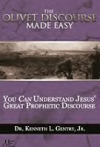

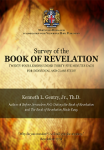








July 15, 2016
WHY STUDY ESCHATOLOGY
PMT 2016-051 by Kenneth L. Gentry, Jr.
 Doctrines revolving around the end of the world and the return of Christ are extremely popular today. And since his return is a foundational doctrine of the historic Christian faith, it well deserves our notice. Unfortunately though, the second advent is more deeply loved and firmly believed than biblically understood and accurately proclaimed. Evangelicals too often tend to have a “zeal without knowledge” when approaching this great biblical theme. This is especially tragic in that properly comprehending it is vitally important for framing in a Christian worldview. After all, it exalts the consummate glory of his redemptive victory, completes God’s sovereign plan for history, and balances a full-orbed theology of Scripture. In this regard I would note:
Doctrines revolving around the end of the world and the return of Christ are extremely popular today. And since his return is a foundational doctrine of the historic Christian faith, it well deserves our notice. Unfortunately though, the second advent is more deeply loved and firmly believed than biblically understood and accurately proclaimed. Evangelicals too often tend to have a “zeal without knowledge” when approaching this great biblical theme. This is especially tragic in that properly comprehending it is vitally important for framing in a Christian worldview. After all, it exalts the consummate glory of his redemptive victory, completes God’s sovereign plan for history, and balances a full-orbed theology of Scripture. In this regard I would note:
Christ’s victory
First, the second coming exalts the victory of Christ in redemption. When Christ comes in his first century incarnation, he comes in a state of humiliation. That is, he dwells among sinners in the dust of the earth, suffers rejection, abuse, and torment from them, then dies in agony on the cross, experiencing even rejection by God the Father (Mt 27:46//), and is buried in a tomb in the dust of the earth. As Paul expresses it: “being found in human form, he humbled himself by becoming obedient to the point of death, even death on a cross” (Php 2:8; cp. Mt 1:21; Lk 19:10). But Scripture does not leave him on the cross or in the tomb; it teaches his consequent glorification through four steps: resurrection, ascension, session, and, ultimately, return.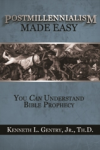
Postmillennialism Made Easy (by Ken Gentry)
Basic introduction to postmillennialism. Presents the essence of the postmillennial argument and answers the leading objections. And all in a succinct, introductory fashion.
See more study materials at: www.KennethGentry.com
Christ’s return in glory is necessary for completing his redemptive victory, for then he returns as the all-conquering Redeemer-King. “Therefore God has highly exalted him and bestowed on him the name that is above every name, so that at the name of Jesus every knee should bow, in heaven and on earth and under the earth, and every tongue confess that Jesus Christ is Lord, to the glory of God the Father” (Php 2:9–11). But as Hebrews notes: “Now in putting everything in subjection to him, he left nothing outside his control. At present we do not yet see everything in subjection to him” (Heb 2:8b). So then, Christ’s second coming is necessary for conclusively demonstrating his redemptive victory for all to see.
God’s plan
Second, the second coming completes God’s plan for history. Though Christ legally secures the defeat of sin, death, and the devil in the first century, all three evils remain with us (Ro 7:18–25; 1Pe 5:8–9). Just as we have been legally sanctified in the past (Heb 10:14), are being experientially sanctified in the present (Ro 6:19–22), and will be finally sanctified at the resurrection (1Th 5:23), so Scripture presents Christ’s victory in three stages: He vanquishes these enemies legally before God’s judicial bar (Col 1:13–14; 2:13–15). He continues vanquishing them historically through the gospel’s continuing progress (Ac 26:18; 1Co 15:20–23). He will vanquish then eternally at his second advent, when he concludes history (Ro 8:18–25; Rev 20:10–15).
One of the tragic consequences of the novel theology known as hyper-preterism is its leaving sin and death operating in the Universe so that God must endure their presence forever and ever. However, the Scriptures teach that history will conclude with a final, permanent conquest of evil: “according to his promise we are waiting for new heavens and a new earth in which righteousness dwells” (2Pe 3:13). This occurs when Christ returns: “When the Son of Man comes in his glory, and all the angels with him, then he will sit on his glorious throne. Before him will be gathered all the nations, and he will separate people one from another as a shepherd separates the sheep from the goats. And he will place the sheep on his right, but the goats on the left. . . . Then he will say to those on his left, ‘Depart from me, you cursed, into the eternal fire prepared for the devil and his angels’” (Mt 25:31–33, 41; cp. 2Pe 3:3–15). “The last enemy to be destroyed is death” (1Co 15:26), which results at his return (1Co 15:23–25, 54). Thus, Christ’s second coming appropriately concludes history.
Prodigal Press: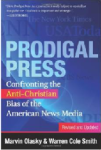
Confronting the Anti-Christian Bias of the American News Media
By Marvin Olasky and Warren Cole Smith
Issuing a clarion call for Christians to reclaim American journalism, Olasky and Smith examine the influence of worldviews on reporting, objectivity, sensationalism, and crusading; the impact of legal, ethical, and technological changes; and the changes brought about by the 24/7 news cycle, the Internet, and social media.
See more study materials at: www.KennethGentry.com
Scriptural balance
Third, the second coming balances the theology of God in Scripture. This glorious doctrine not only finalizes Christ’s redemptive victory (pouring eternal glory on his redeeming love) and completes the plan of God (demonstrating divine wisdom in his creational plan). But it also provides us with a full-orbed doctrinal system balancing out majestic biblical truths. Were it not for the second advent:
We would have a creation (Ge1:1; Heb 11:3) without a consummation (Ac 3:20–21; Rev 20:11), resulting in an open-ended Universe (1Co 15:23–24; 2Pe 3:3–4).
We would have a world eternally groaning (Ro 8:22; 2 Co 5:1–4), without any glorious perfection (Ro 8:21; 2Pe 3:12–13).
We would have a Savior quietly departing before his followers (Lk 24:50–52; 1Co 15:5–8), without ever enjoying a victorious exhibition before his world (Ro 14:11; Php 2:10–11).
We would have a redemption spiritually focused (Ro 8:10; Eph1:3), without a physical dimension (Ro 8:11; 1Th 4:13–18).
We would have a Redeemer bodily ascended into heaven (Ac 1:8–11; Col 2:9), without any physical family joining with him (1Co 15:20–28; Php 3:20–21).
We would have a gospel continually necessary (Mt 28:19; Ac 1:8), without any final victory (Mt 28:20; 1Co 15:24) — the number of the elect would never be filled.
Truly, the second coming is a “blessed hope” upon which we must carefully focus. Unfortunately, though it is “blessed” and hope-filled, “eschatology, perhaps more than any other branch of theology, is laden with divisiveness, and this is particularly true in conservative evangelical circles.”1 Tragically, this issue “has been a matter of debate, sometimes acrimonious.”2 Indeed, “perhaps no doctrine has more divided modern evangelical Protestantism.”3 So, before we can properly understand all the implications of the second coming, we must establish our theological context.
Notes
Donald G. Bloesch, The Last Things: Resurrection, Judgment, Glory (Downers Grove, Ill.: InterVarsity, 2004), 28.
Gehrard Sauter, Eschatological Rationality: Theological Issues in Focus (Grand Rapids: Baker, 1996), 33.
Bloesch, The Last Things, 87.









July 12, 2016
THE CHURCH IS GROWING
PMT 2016-050 by Krish Kandiah
Without my glasses, younger children in my household look at me as though I am a stranger they have never met before. To me, the world around feels very different. Last week my glasses were stolen and I became very aware how my myopia caused me to feel disoriented, claustrophic, nervous, and unconfident.
Something similar happens to Christians when we lose our global glasses. We fail to see what God is doing on the world stage and instead we become parochial and introverted, limited in our vision and witness.
For the 31st year in a row the International Bulletin for Missionary Research (IBMR) has produced its state-of-the-globe report on religious statistics. It’s a fascinating read and the meticulous work of the Gordon Conwell Theological Seminary-based Centre for the Global Study of Christianity is to be applauded. Here are five trends that struck me as I read through the statistics.
1. The Church is growing slowest in Europe and North America
The good news is that the Church is still growing in Europe and North America. The increase is small, but there is increase nevertheless. Whether the growth is attributable solely to migration or birthrate I am not sure, but there is still a net increase in the number of Christians in the West. Since 1900 the Church in Europe has seen a 52.2 per cent increase, rising from 368,254,000 in 1900 to 559,900,000 in 2015. But alongside the fact that the world’s population has grown by 78 per cent in the same period, those statistics don’t sound quite so impressive. Even more challenging would be the change in percentage of Europeans that now claim any kind of Christian affiliation, which is not a figure that the IBMR report currently publishes.

Greatness of the Great Commission (by Ken Gentry)
An insightful analysis of the full implications of the great commission. Impacts postmillennialism as well as the whole Christian worldview.
See more study materials at: www.KennethGentry.com
Molly Wall, the programme director of Operation World, adds that amid concern for the overall decline in Christians, evangelicals in Europe can feel encouraged as “evangelical Christianity grew in strength and confidence in most European countries from the 1990s to the present, even while the overall population grew slowly or even declined”.
2. The Church is growing dramatically in the rest of the world
The Church has seen dramatic and explosive growth in Asia, Africa and South America. The growth of the African Church in particular is jaw-dropping. In 1900 there were fewer than 9 million Christians in Africa. Now there are more than 541 million. In the last 15 years alone, the Church in Africa has seen a 51 per cent increase, which works out on average at around 33,000 people either becoming Christians or being born into Christian families each day in Africa alone.
Strangely, this statistical growth is often met with some scepticism by the western Church.
I often hear derogatory remarks about Christianity outside Europe, North America and Australia. There is a superiority complex when it comes to the global Church. There remains a conviction that Western Christians should be congratulated for heading off on teaching ministries to educate church leaders or for raising funds to correct theological challenges in the rest of the world. Christians in Nigeria and South Sudan are facing extreme levels of persecution and the Church is still growing, but it is rare for Christians in the West to think that we have anything to learn from believers there. Very few of our conference speakers, authors, worship leaders or resources originate from ‘the rest of the world’.
Lord of the Saved
(by Ken Gentry)
A critique of easy believism and affirmation of Lordship salvation. Shows the necessity of true, repentant faith to salvation.
See more study materials at: www.KennethGentry.com
So despite stupendous growth and spiritual blessing there is still a colonial mindset in western Churches that wishes to downplay God’s work in those countries. Perhaps it is time that our conference organisers, publishers and missionary organisations help the Church in the West to reorient its place in the global Church, ensuring that we approach our brothers and sisters in the two-thirds world with greater humility and a willingness to learn.
3. Christianity is easily the world’s largest religion
When every form of Christianity is added together there are more than 2.4 billion Christians worldwide. So just over a third of the world’s total population claim some kind of Christian faith. This figure includes what we know as nominal Christians, who may know very little of the Christian faith and may not practise their beliefs, but nevertheless in a census declare themselves as Christian. Islam comes second, with 700 million fewer adherents. Christians in the UK need to remember this when they see church services attracting fewer people than they did before, some church buildings being repurposed as restaurants and homes and the Christian faith losing some of the influence and confidence it used to hold in the public square.
Professor Brian Stanley of Edinburgh University’s Centre for World Christianity reminds us Christianity “neither began in western Europe, nor has it ever been entirely confined to western Europe. The period in which it appeared to be indissolubly linked to western European identity was a relatively short one, lasting from the early sixteenth to the mid-twentieth centuries.” Christianity used to have its global centre in Israel, then later in Syria and eventually in Italy and Turkey. It now seems that the centre of gravity has moved to Africa.
To continue reading:
http://www.christiantoday.com/article/a.growing.church.why.we.should.focus.on.the.bigger.picture/49362.htm









July 8, 2016
ISLAM IS DYING
PMT 2016-049 by Christian Muslim Answers
During the last centuries, the number of Muslims in the world has been increasing steadily. Statistics for the year 2010 are telling us that the Muslim population is 1.6 billion. 1 In 1973 the Muslim population was only 0.5 billion. 2 Many Muslims believe that Islam will be the world’s religion in future, because Islam is growing. However new statistics show that Islam is dying a slow death. The following reasons:
1. Decline in birth rate under Muslims
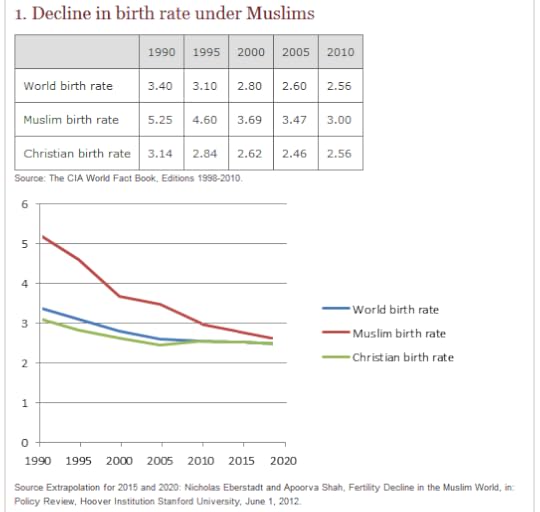
For many centuries, Islam was growing because of a higher birth rate. However, since last decades birth rate is declining fast. From 1990-2010 the world birth rate declined from 3.40 to 2.56. A fall of 0.84 births per women or a birth rate decline of 25% over the 20 years. The average birth rate for the Muslim majority countries declined in the same period from 5.25 to 3.00. A Muslim birth rate decline of 43% over the 20 years. Extrapolation of the statistics shows that the Muslim birth rate will go below world average. The Birth rate of 49 Muslim countries is -40%, while worldwide average is -33%. There is an extraordinary decline in birth rate under Muslims.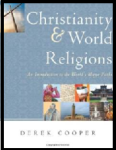
Christianity and the World Religions
By Derek CooperCooper. Examines the rival worldviews found in Hinduism, Buddhism, Confucianism and Taoism, Judaism, Islam, and irreligion. He engages these worldviews from a Christian perspective.
See more study materials: www.KennethGentry.com
The decline of the birth rate is visible in many Muslim countries, including Algeria, Egypt, Iran, Jordan, Lebanon, Tunisia and Turkey. Muslim birth rate decrease in Iran is one of the greatest records in history. There are many more Muslim countries with a birth rate decrease of 60% or more: Albania, Algeria, Bangladesh, Kuwait, Libya, Oman, Qatar, Tunisia, and the United Arab Emirates. A Muslim woman has today 2.6 less babies than her mother, which is a faster decline than worldwide average.
Extrapolation of the statistics show that Muslim growth rate will go down. A stable population needs a birth rate of 2.1 children. That means that the Muslim population will decrease both relative and absolute. It also means that it is the main reason that Islam is a fast dying religion. Unlike Christianity, Islam is not able to grow much by conversion, see next paragraph.
2. Low growth by conversion compared with Christianity
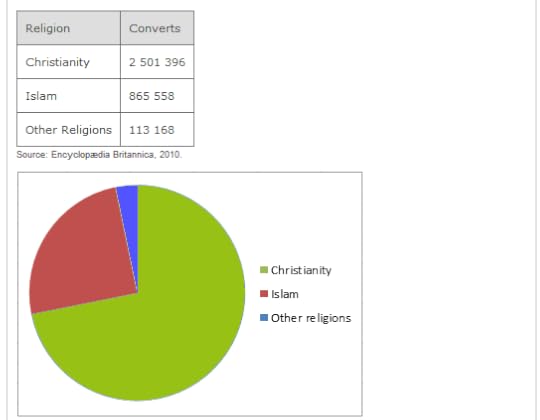
There are more conversions to Islam than conversions to most other religions. However, there are almost three times more conversions to Christianity than to Islam. For example, in Africa more than 6 million Muslims become a Christian 7. Therefore Islam is not able to grow faster than Christianity by conversions. Muslim converts leave Islam soon: Muslim sociologist Dr. Ilyas Ba-Yunus has published that 75% of New Muslim converts in the U.S. leave Islam within a 3 years. Because birth rate of Muslims went below world average and Islam cannot compensate with conversions, Islam is dying, while Christianity is growing.
3. Decline in marriage rate under Muslims
More and more Muslim women are marrying a husband who isn’t a Muslim. Lots of educated Muslims discover the weakness and barren elements of Islam. The higher education of Muslims and the improved information channels have brought about the slow death of Islam.
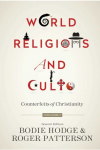
World Religions and Cults (Bodie Hodge, ed.)
This work is helpful for understanding and combating false religions and cults. It deals with the leading false religious beliefs in the world today.
See more study materials at: www.KennethGentry.com
4. Muslim growth will be less than Christian growth in near future
India is one of the countries in the world with a large Muslim population. According to statistics of the Indian government, Muslims still have a higher growth rate than Christians, but the differences are lower every year.
What causes a higher growth? Higher fertility rates, higher immigration and lower mortality rate, but fertility rate is most important. What causes a high fertility rate? Low education of women and low budget. Muslims are the poorest group in India, while Christians belong to the most richest. Although Christians are rich and Muslims poor and Christians have a lower fertility rate than Muslims, the growth of Christians is the same as the average population in India. This is because of conversion of Hindus and Muslims to Christianity. From the Indian government statistics in 2015 we may expect that the growth of Christian will be higher than the groth of Muslims after 2030.
5. Islam is an anti-intellectual religion
Because a Muslim must accept only the Qur’an as source of truth since 12th century, free thinking is forbidden. The rise of the historical research and its application to the Qur’an and Islam in general means there is nothing new in the Qur’an that was not available before 7th century. The Qur’an is not able to withstand the onslaught of Western scientific thought. Many Christians have accepted the results of science, adjusted their beliefs accordingly. Muslims have yet to take even this first step.
Therefore Islam is against the intellect and a Muslim cannot get the same level of intellectual benefits as Christians.
6. Economic backwardness in Muslim countries
To continue reading:
http://www.christianmuslimanswers.com/muslims/islam_dying
Click on the following images for more information on these studies:


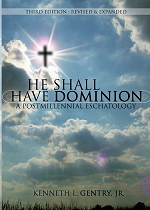








July 5, 2016
WHY THE LOCAL CHURCH IS TRENDING UP
PMT 2016-048 by Brian Douglas
Fear for the church’s future is trending. It’s almost too easy nowadays to fall into despair: Christians’ interactions with culture and politics can often seem clumsy or foolish, and you don’t have to look far for biblical compromise, destructive power-plays, or “scandal du jour” moral failure. Compounding the problem is the fact that the modern church has been shattered into 30,000 to 42,000 denominations (depending on which study you read)-a degree of division that further damages its credibility.
Perhaps most damning, though, is the abundance of personal betrayals common church folk have experienced. I have personally survived three congregational civil wars, witnessed the deaths of two churches, and been pushed out of a plane mid-flight (figuratively speaking, of course) by pastors whom I trusted closely. Many Christians have known far worse than that.
It can be difficult, then, to feel rosy about the church’s future when it seems so weak, or even destructive. Yet an hour’s perusal through church history reveals that none of these fears are unique to our time; it’s always been easy to criticize the church because the church has always deserved criticism.
Christ’s Church (20 mp3 downloads)
by Ken Gentry
An in-depth sermonic presentation of the doctrine of the church.
See more study materials at: www.KennethGentry.com
That same hour also shows there is always more to the story than compromise and incompetence. At any point in its history, the church is a case study in the contrast between appearance and reality. Despite all indications to the contrary, and far beyond any expectations, it has flourished. If you find yourself nervous about its future, though, consider the following:
1) The Unstoppable Growth of the Church.
Maybe it’s harder to observe from a land of ecclesiastical decline like the United States, but globally, the church is growing-and has been, in fact, since its foundation.
For example, in a 2014 address at the Spurgeon Fellowship in Spokane, Michael Kelly described the growth of Christianity worldwide since the first century. While the church’s growth was initially slow, it has progressed steadily over time. In A.D. 100, there was only one professing Christian for every 360 non-Christians in the world. Today, about one-third of the world’s population claims to be followers of Christ.
According to Kelly’s data, the church’s growth hasn’t just continued . . . it’s accelerated. In the church’s first 1,000 years, the ratio of Christians to non-Christians lowered from 1:360 to 1:270. By A.D. 1500, it was 1:85-almost triple the growth of the previous millennium in only half the time. Since then, the rate of growth has continued to rise steadily, with the ratios hitting 1:21 in 1900 and 1:13 in 1970 before reaching today’s 1:2.
Reflecting on numbers like these in a post at First Things, Peter Leithart described ours as “the greatest era of Christian expansion” in history. “It is old news now,” writes Leithart, “but it is news that we should be reminded of regularly.” And that same expansion has both fueled and been fueled by . . .
2) The Explosive Growth of Missions.
In his 2011 book The Future of the Global Church, Patrick Johnstone noted the expansion of Christian missions in the 20th century. Again, the growth is staggering-in modern history alone, the world’s population of Christian missionaries has grown an astounding 1,624 percent, from 17,400 in 1900 to an estimated 300,000 in 2011. A 2013 report by the Center for the Study of Global Christianity at Gordon-Conwell Theological Seminary reported an even higher total: 400,000.
Genesis and Creation (Set 1: Genesis 1).
An in-depth sermon series on the opening chapters of the Bible from a Six-day Creationist perspective. Offers many insights into the reason Moses wrote the Creation Account, insights little recognized by the average Christian. This is set 1, which covers Genesis 1.
See more study materials at: www.KennethGentry.com
Perhaps what’s most surprising, though, is the well-documented shift away from Eurocentrism toward a more global Christianity. According to a 2015 article in TheWashington Post, in 1900, North America and Europe held a full 80 percent of the world’s Christians. A century later, however, that percentage was halved by the church’s growth elsewhere. At the same time, the United States has gone from being a major sender of foreign missionaries to being the world’s largest recipient-over 32,000 in 2010.
Meanwhile, the non-Western world has been particularly fruitful soil for growth. During the 20th century, for instance, the number of Christians in Africa rose from less than 10 percent of the continent’s population to nearly 50 percent. The Pew Research Center calculates that today, 25 percent of the world’s Christians are in Africa-and that is expected to grow to 40 percent by 2030. Similar growth rates are occurring in Asia, where Christianity has grown twice as fast as population over the last century.
3) Healthy Growth in Hostile Places.
Throughout the centuries, Christianity has consistently grown best in the hardest of contexts. From Jerusalem and the Roman Empire to modern China and the Muslim world, times and places of resistance, opposition, and religious persecution have counterintuitively been the most fertile grounds for the church to take root.
Consider contemporary China: in 1976, when Chairman Mao died, few would have predicted that the Chinese church would ever thrive. Now, however, just two generations later, Christianity has spread across China like wildfire. According to a 2014 article in the Telegraph, there were one million Chinese Protestants in 1949. In 2010, there were 58 million-a 5,700 percent growth in 61 years. If current rates continue, China is set to have more Christians than any other nation by as early as 2030.
There are signs of similar growth beginning in the Islamic world, too. In 2014, the Times reported that Christianity is growing faster in Iran than anywhere else on the globe at about a 20 percent increase per year.
Despite such research on the global growth of the church, though, it can be hard for many Western Christians to feel like the church is really doing well. Perhaps here and now, in my own church, the news is not very good. Maybe the “big picture” seems like a snapshot taken on another world. But if we consider the testimony of Jesus and the apostles, then . . .
4) This Surprising Growth Shouldn’t Surprise Us. . . .
To continue reading:
http://www.christianitytoday.com/local-church/dispatches/fear-not/hope-in-numbers.html?share=CpqoEIi9NkCKCVFmM8rXKmfxpOOKWwq1









July 1, 2016
POSTMILLENNIALISM IN THE GREAT COMMISSION (4)
 PMT 2016-047 by Kenneth L. Gentry, Jr.
PMT 2016-047 by Kenneth L. Gentry, Jr.
The Great Commission truly sets forth a Great commission. It institutes a program of immense proportions, a program calling for world transformation. Christ s the discipling of all nations in all things He has taught. He lays upon His people the task of bringing all men and their cultural endeavors under the redemptive Lordship of the Triune God.
How can such a program be accomplished? Surely He did not expect it to occur over night. Millions of evangelicals teach that Christ’s coming to end history as we know it has been imminent ever since He ascended into heaven. They live by the standard of pop-theologian Hal Lindsey: “We should be living like people who don’t expect to be a round much longer.” Who would set themselves to the long, expensive, difficult, time consuming task of world transformation if he believed the world as he knows it could end at any moment?
But the language of the Great Commission strongly implies the historical long run. Christ says literally: “I will be with you all the days.” He did not say, “Expect me to return to cease your labors at any moment.” Just as the preceding “all’s” are to be understood in their fullness, so is this statement of the duration of His presence with His people to ensure the accomplishment of the task.
Election and Free Will
by Robert A. Peterson
Election and Free Will helps Christians who believe in a Reformed view of predestination to better understand their faith. Robert A. Peterson traces Scripture’s teaching on election through the Bible and explains the doctrine of free will. He also tackles objections to predestination and concludes with applications of this neglected biblical teaching.
See more study materials at: www.KennethGentry.com
How extensive is Christ’s authority? It encompasses “all authority in heaven and on earth.”
How broad is the ministry to apply? It is to involve the discipling of “all the nations.” How thorough is the training to be? In “all things whatsoever” He taught. How long is the time He left for His disciples? He did not say, “Perhaps I’ll be back tomorrow.” Rather He speaks of the ever lengthening vistas of the future, declaring: “I will be with you through all the great number of days stretching out before you.”
Had He not taught His disciples to expect a long delay before His return? In the Parable of the Virgins He warned that “while the bridegroom was delayed, they all slumbered and slept” (Matt. 25:5). In the Parable of the Talents He warned: “After a long time the lord of those servants came and settled accounts with them” (Matt. 25:19).
Christians, we must train our children and those who are converted to Christ through our evangelism to dig in for the long haul. It is in this century we have seen what secularists call “the triumph of humanism.” It is also in this century that we have seen the triumph of the dispensationalist imminency doctrine, that has effectively removed an earlier widespread Christian cultural endeavor. Too many Christians have withdrawn from culture to await Christ’s any moment appearing. I think the triumph of dispensationalism is partly related to the triumph of humanism.
Finding a Vision
(by Michael Milton)
Presents a biblical vision of church ministry and involvement.
See more study materials at: www.KennethGentry.com
The task before us is enormous. But the equipment is sufficient: The One with all authority s us. He has given us all the days. And He promises us: “I will be with you.” In the Greek this statement has great emphasis: “I, I will be with you.”
We may confidently expect success in the long run. Christ, Christ is with us. The Old Testament prophets, the New Testament Apostles, and the Lord of glory all look to glorious days in earth’s future in which all nations “from the river to the ends of the earth” will come and bow down before Him. And He uses His people to get the task accomplished under His administration.
The Great Commission ends appropriately in the Majority Text: “Amen.” Amen means simply, “So be it.”









June 28, 2016
POSTMILLENNIALISM IN THE GREAT COMMISSION (3)
 PMT 2016-046 by Kenneth L. Gentry, Jr.
PMT 2016-046 by Kenneth L. Gentry, Jr.
In my previous studies I have been analyzing the Great Commission as a foundational text for postmillennialism. In those studies I noted that the Commission revolves around four “all’s.” The first two all’s highlighted Christ’s authority as “all authority” and his directive to disciple “all nations.” In this study we will look at the third all: “all things.”
Christ commands us to disciple all nations. But what does he mean? The discipleship idea involves training in the Christian faith. The Greek word is matheteuo, which involves authority over another person so as to train them for service. In the Great Commission it is definitely redemptive in orientation, for it includes baptism in the Name of the Triune God. It is no simple humanitarianism; it is no social gospel.
The Great Commission does not merely speak of being a witness to all nations, else the word would have been martureo. It is not just to preach to all nations, or the word would have been kerusso. We are actually to disciple, to bring under Christ’s yoke and to train, all nations.
Dispensationalists often misconstrue this. Charles Feinberg writes that “Nothing could be plainer in the New Testament than that in this age of grace God uses the church, members of the body of Christ, to be witnesses throughout the earth.” He then refers to Matthew 28:18-20. The terminology employed by the Lord will not allow this reduction of the Great Commission. It will not tolerate the Great Commission to all nations becoming the Great Suggestion to scattered individuals.
The Christ of the Prophets (by O. Palmer Robertson)
Roberston examines the origins of prophetism, the prophets’ call, and their proclamation and application of law and covenant.
Certainly this entails evangelism. That is the absolutely crucial and essential starting point for Christian discipleship. Apart from the saving grace of Jesus Christ in the heart of the sinner “the carnal mind is enmity against God; for it is not subject to the law of God, nor indeed can be. So then, those who are in the flesh cannot please God” (Rom. 8:7-8). The Lord clearly taught that “as many as received Him, to them He gave the right to become children of God, even to those who believe in His name: who were born, not of blood, nor of the will of the flesh, nor of the will of man, but of God” (John 1:12-13). He also informs us that “unless one is born again, he cannot see the kingdom of God” (John 3:3).
We ought to be engaged in reaching out to the lost and presenting them the saving gospel of Jesus Christ. Historic, orthodox Christianity sees the fundamental need of man as a right relationship with God. And that cannot be gained apart from the supernatural salvation wrought by Christ: “Therefore, having been justified by faith, we have peace with God through our Lord Jesus Christ, through whom also we have access by faith into this grace in which we stand, and rejoice in hope of the glory of God” (Rom. 5:1-2).
But it does not stop there, as dispensationalists are prone to think. Megachurch fundamentalist pastor Jack Hyles once wrote of the Great Commission: “Notice the four basic verbs: (1) Go. (2) Preach. (3) Baptize. (4) Teach them again. You teach them something after you get them saved and baptized. What do you teach them? To….’observe all things whatsoever I have ed you.’…. Now what did He us to do? Go, preach, baptize, then teach what He ed us to do. So, we teach them to go, preach, and baptize, that they may teach their converts to go and preach and baptize.”
The Lord s that we should “teach them to observe all things that I have ed you” (Matt. 28:20). And it is abundantly clear that Christ did not limit His teaching to the message of individual salvation from hell. And He promised to lead His disciples into all truth (John 16:13), so everything they taught was what He would have them teach. Yet they did not limit their teaching to personal redemption, either. Had such been the case, the Gospels would have been much, much shorter, as well as the New Testament as a whole.
In His first major discourse, the Sermon on the Mount, we read of the Lord’s reaffirmation of the Law of God: “Do not think that I came to destroy the Law or the Prophets. I did not come to destroy but to fill it full measure” (Matt. 5:17). Paul states in Romans 3:31: “Do we then make void the law through faith? Certainly not! On the contrary, we establish the law.” And surely the Law of God cannot be limited solely to personal salvation. It must apply to the wider culture of man. Thus, this is one major feature of the “all things” Christ taught. Consequently, our discipleship instruction ought to include the Law of God, as well.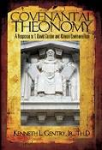
Covenantal Theonomy
(by Ken Gentry)
A defense of theonomic ethics against a leading Reformed critic. Engages many of the leading objections to theonomy.
See more study materials at: www.KennethGentry.com
When we read the New Testament we discover a broad scope in the teaching of Christ and His Apostles. Their scope is as broad as the world. Christ came to save individual sinners from their sin, to be sure. But as I have said, He came also to save the “world,” the whole system of men and things. Hence, the broad world and life teaching of Christ and the Apostles. The New Testament promotes a Christian view of social duty and involvement.
Of course, the New Testament is concerned with marriage and divorce (Matt. 5:27-32), family relations (Eph. 5:22-33), and child rearing (Col. 3:21), as all agree. But it also instructs us regarding the rich man’s duty to the poor (Matt. 25:31-46), employer-employee relationships (Eph. 6:5-9), honest wages (Luke 10:17), free-market bargaining (Matt. 20:1-15), private property rights (Acts 5:4), godly citizenship and the proper function of the state (Matt. 22:21), the family as the primary agency of welfare (1 Tim. 5:8), proper use of finances (Matt. 15:14ff), the dangers of debt (Rom. 13:8), the morality of investment (Matt. 25:14-30), the obligation to leaving an inheritance (2 Cor. 12:14), penal restraints upon criminals (Rom. 13:4), lawsuits (1 Cor. 6:1-8), and more. In doing so, it reflects and supplements the socio-cultural concern of the Old Testament, urging the people of God to live all of life under Christ’s authority, not just the inner-personal or family or church areas of life. Hence, the to “observe all things I taught you.”
Thus, the Christian discipleship program should teach the whole Word of God, which equips us for every good work (2 Tim. 3:17). The Christian disciple should be engaged in exposing works of darkness (Eph. 5:11). He should not only be confronted the negative through rebuke, but supplanting it through a challenge with the Truth and by a positive reconstructing of all of life: “The weapons of our warfare are not carnal but mighty in God for pulling down strongholds, casting down arguments and every high thing that exalts itself against the knowledge of God, bringing every thought into captivity to the obedience of Christ” (2 Cor. 10:4-5). Thus, as Paul says: “Do not be conformed to this world, but be transformed by the renewing of your mind, that you may prove what is that good and acceptable and perfect will of God” (Rom. 12:1-2).
Click on the following images for more information on these studies:











June 24, 2016
POSTMILLENNIALISM IN THE GREAT COMMISSION (2)
 PMT 2016-045 by Kenneth L. Gentry, Jr.
PMT 2016-045 by Kenneth L. Gentry, Jr.
In my last article I began to consider the Great Commission and its implications for postmillennialism. I am highlighting the greatness of the Great Commission as a key component of the postmillennial system. My study will focus on each of the four appearances of the word “all” in the Lord’s truly Great Commission. In this study I will focus on “all authority.”
As with “all authority,” it is important that we grasp the significance of “all nations.” The word “nations” is the Greek word ethnos. It is based on the Greek word ethos, which indicates habits or customs of people; cultural relations. Thus, ethnos speaks of collected masses of men, considered as bound together by social bonds, forming a culture.
Ethnos here does not signify merely “gentile.” The Jews themselves are called ethnos ten times in the New Testament (e.g., Luke 7:5; John 11:48; Acts 10:22). The term indicates people grouped in terms of their cultural relations, and involves Jews and non-Jews. He speaks of every culture of man, when he speaks of “all nations.” And He speaks of men in terms of their cultural relations.
As It Is Written: The Genesis Account Literal or Literary?
Book by Ken Gentry
Presents the exegetical evidence for Six-day Creation and against the Framework Hypothesis.
See more study materials at: www.KennethGentry.com
It is important to recognize that the Lord did not say, “disciple all men” (anthropos), as if His interest was individualistic, concerned with men only as stray individuals. Neither did He , “disciple all kingdoms” (baseleia), as if His interest was purely political. The to disciple “all nations” is directed to the conversion and discipling of the human race, as such, in all of its cultural endeavors. It begins deep within involving the personal, spiritual aspects of life. But it branches out to include the social, legal, academic, economic, and political areas of life, as well.
Thus, we see how the Great Commission is a counterpart to the Cultural Mandate. In the Commission, Christ is implementing a plan to redeem all men and nations. The Commission is not designed so that the Church might “snatch brands from the fire.” It seeks the salvation of man in his every relationship, as massed in cultures. The Great Commission not only has cultural implications, it creates a redeemed culture.
We need to be careful when we say, “Christ is my personal Savior.” Idol worshipers often had a “personal savior” that they could carry around with them wherever they went. Their gods were limited. Certainly Christ is my Savior: He intimately loves me as an individual. But too often Christians tend to imply Christ is sparingly parceled out to individuals in history.
Here, though, we see He has called us to disciple all nations as such. That is His , based on His possession of “all authority.” And He surely expects the discipleship of all nations by His people and the full accomplishment of the task under His providence, as we shall see.
Thus, the Scripture speaks of Christ very often as “the Savior of the world.” When it does so it is not setting forth the doctrine of universalism. There are those who will populate hell forever. Rather such references point to the eventual actual conversion of the world as a system, as a kosmos. The passages that speak thus clearly portray salvation in all of its fullness. These passages do not merely say, “He is the only Savior in the world,” allowing for the vast majority of men to reject Him.
Bringing Heaven Down to Earth
(by Nathan Bierma)
A Reformed study of heaven. By taking a new look at the biblical picture of heaven,
Nathan Bierma shows readers how heaven can be a relevant, meaningful,
inspiring engine of Christian faith and kingdom service.
See more study materials at: www.KennethGentry.com
Consider the strong redemptive terminology used in these passages. John 1:29: “The next day John saw Jesus coming toward him, and said, “Behold! The Lamb of God who takes away the sin of the world!” John 3:17: “For God did not send His Son into the world to condemn the world, but that the world through Him might be saved.” 1 John 2:2: “He Himself is the propitiation for our sins, and not for ours only but also for the whole world.” Romans 11:15: “For if their being cast away is the reconciling of the world, what will their acceptance be but life from the dead?” 2 Corinthians 5:19: “God was in Christ reconciling the world to Himself, not imputing their trespasses to them, and has committed to us the word of reconciliation.”
Truly Christ expects to see a redeemed world one day! The world will be saved, man’s sins propitiated, and the human race reconciled to God. Certainly He commissions us to promote this very task. We are to disciple “all the nations” so that the world as a kosmos, a system of men and things will become Christian.
It is abundantly clear that He seeks the actual discipling of all nations. They are to be brought under the yoke of the authority of the Triune God: “Go therefore and make disciples of all the nations, baptizing them in the name of the Father and of the Son and of the Holy Spirit” (Matt. 28:19). The plural “them” in the to baptize, refers back to the plural noun “nations,” which is separated from it by only one word in the Greek. And baptism is only for those under the rule of Christ’s kingdom — believers and their seed.
Click on the following images for more information on these studies:

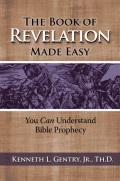
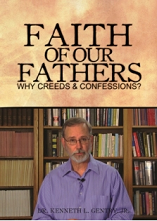








June 21, 2016
POSTMILLENNIALISM IN THE GREAT COMMISSION (1)
 PMT 2006-044 by Kenneth L. Gentry, Jr.
PMT 2006-044 by Kenneth L. Gentry, Jr.
One of the most beloved passages of Scripture is the Lord’s Great Commission. Most Christians know it quite well, are able to find it in the Bible, and can cite it by heart. They also instinctively love it as the command of the resurrected Lord. Unfortunately, though it is well-known, it is poorly understood. It is loved as a foundational command for Christ’s church, giving her the marching orders of the exalted Christ. But it is seldom recognized as a strong witness to the postmillennial hope which provides an optimistic outlook on history.
In this four-part study, I will provide an exposition of the Great Commission, demonstrating its postmillennial orientation. We can see the glory of the Commission if we note the four appearances of the word “all” in it. In this lesson I will focus on the first two “alls”: Christ’s claim to “all authority” and his charge to disciple “all nations.” Let’s get started.
All Authority
It is extremely important to remember that the Great Commission is given after the resurrection. The significance of the resurrection is not fully appreciated by modern evangelicals, who are more theologically attuned to singing “There Is None Like the Lowly Jesus,” than “Crown him with Many Crowns.” Their eschatology and over all view of historical progress is more shaped by the Fall of Adam than the Resurrection of Christ.
Prior to the resurrection, a frequent refrain of Christ was: “I can do nothing of Myself” (cf. John 5:19, 30; 8:28; 12:49; 14:10). But now after the resurrection, Christ says: “All authority has been given to Me in heaven and on earth” (Matt. 28:18). “Given” is an aorist passive verb, which speaks of this grant of all authority as occurring at a past point in time. This grant of “all authority in heaven and on earth” is given by God the Father, who according to similar terminology in Matthew 11:25; Acts 17:24; and elsewhere, is called “Lord of heaven and earth.”
Greatness of the Great Commission (by Ken Gentry)
An insightful analysis of the full implications of the great commission. Impacts postmillennialism as well as the whole Christian worldview.
See more study materials at: www.KennethGentry.com
This investiture of Christ with universal authority is a frequent theme of Scripture. Acts 2:30-31, the passage which the Lord used to deliver me from dispensationalism, reads: David “being a prophet, and knowing that God had sworn with an oath to him that of the fruit of his body, according to the flesh, He would raise up the Christ to sit on his throne, he, foreseeing this, spoke concerning the resurrection of the Christ…” (Acts 2:30-31). Here that investiture with kingly authority at His resurrection is to the Messianic throne of David. He is seated there in confident expectation of victory, as Peter points out by citing Psalm 110:1 in Acts 2:34: “For David did not ascend into the heavens, but he says himself: The LORD said to my Lord, Sit at My right hand, till I make Your enemies Your footstool. Therefore let all the house of Israel know assuredly that God has made this Jesus, whom you crucified, both Lord and Christ” (Acts 2:34-36). (Incidentally, Psalm 110:1 is in the New Testament the most frequently cited and alluded to passage from the entire Old Testament.)
Romans 1:4 says: He is “declared to be the Son of God with power, according to the Spirit of holiness, by the resurrection from the dead” (Rom. 1:4). Again we see that He was invested with authority as the Son of God at the resurrection.
This great theme of “all authority in heaven and on earth” is echoed in Ephesians 1:19-22: “His mighty power [was] worked in Christ when He raised Him from the dead and seated Him at His right hand in the heavenly places, far above all principality and power and might and dominion, and every name that is named, not only in this age but also in that which is to come. And He put all things under His feet, and gave Him to be head over all things to the church.” follows suit: “Therefore God also has highly exalted Him and given Him the name which is above every name, that at the name of Jesus every knee should bow, of those in heaven, and of those on earth, and of those under the earth.”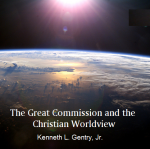
Great Commission and the Christian Worldview
Nine mp3 lectures by Ken Gentry
In these nine lectures is demonstrated the world altering consequences of the Great Commission. An important and encouraging study on the biblical foundations of the Christian worldview.
See more study materials at: http://www.KennethGentry.com
What, then, is the nature of this grant of “all authority”? The “all” here is used in the distributive sense. It indicates “all kinds” of authority; authority in every realm. He possesses every kind of authority in heaven (i.e., in the spiritual realm) and on earth (i.e., in the temporal realm). He does not claim authority only over the Church or over individual redeemed men. He claims authority over the family, education, business, politics, law, medicine — all areas of life.
The “all authority in heaven and on earth” reflects God’s authority in Matthew 11:25, as we have mentioned: “I thank You, Father, Lord of heaven and earth.” We must ask ourselves: In what areas of life is God’s authority limited? Obviously in no area, for “the earth is the Lord’s, and all its fullness, the world and those who dwell therein” (Psa. 24:1). When you call Jesus “Lord,” you are not just speaking of His Lordship over your spiritual life as an individual. You are affirming His lordship in all areas of life, in whatever calling you or anyone else undertakes “on earth.” Truly this is a Great Commission.
Click on the following images for more information on these studies:











June 17, 2016
MUSLIMS TURNING TO CHRIST
 PMT 2016-043 by David Garrison
PMT 2016-043 by David Garrison
(Ken Gentry: The following article by church historian David Garrison, Ph.D., was published in The Aquila Report (June 7, 2016). It contains encouraging research regarding Muslim conversions, which would fit postmillennial long-term expectations.)
Ten-year-old Nadia wasn’t surprised when her father signed her marriage contract, nor when she had to move in with her 20-year-old husband two years later. Nadia’s experience is not unusual in the Islamic Republic of Iran. It also wasn’t out of the ordinary when her husband became an opium addict (Iran has the highest rate of drug addiction in the world). Two of Nadia’s brothers also succumbed to drugs. One was sentenced to prison for killing a man in a drug-related dispute, the other committed suicide. One day Nadia’s cousin who had recently become a Christian quietly gave her a New Testament in the Persian language.
Nadia prayed, ‘Allah, show me your truth.’ As she read it, Nadia said, ‘I felt my heart open like an old door. Inside I felt very warm and thirsty. It was like drinking cool water, and I wanted to drink it all.
‘From that time on,’ Nadia recalls, ‘Jesus’ work started in me. It was a strange happiness like nothing I’d ever known.’ Within a week she’d led her husband and three children to faith in Jesus.
The good news gets better. What Nadia experienced has been happening to thousands of other men and women throughout Iran (see Real Life, p.22), and across much of the Muslim world.
Collecting testimonies
Five years ago, I began an investigation into increasing reports of Muslim movements to faith in Christ. (I defined a movement of Muslims to Christ to be at least 100 new churches started or 1000 baptised believers, all of whom have come to Christ over the past two decades.) I wanted to understand how and why entire communities were not only turning to faith, but being baptised – an act of confessional obedience that could earn them the death penalty under Islamic law.
Christianity and the World Religions:
By Derek CooperCooper. Examines the rival worldviews found in Hinduism, Buddhism, Confucianism and Taoism, Judaism, Islam, and irreligion. He engages these worldviews from a Christian perspective.
See more study materials: www.KennethGentry.com
My survey took almost three years and led me into every corner of the Muslim world. I travelled more than a quarter-million miles, from West Africa to the Indonesian islands. In the process, I visited 44 movements, each with more than 1,000 Muslim-background believers in Jesus Christ who had been baptised as a defiant act of their new-found faith. With the help of dozens of on-the-ground collaborators, I was able to gather more than 1,000 interviews with these courageous men and women.
Akbar al-Masih
I met Akbar al-Masih in the crowded Pakistani city of Rawalpindi. Akbar was a Muslim-background believer from Afghanistan. Like many Pushtun people, Akbar’s life had been torn apart by war. After the 2012 US invasion, Akbar joined millions of refugees who streamed into Pakistani slums and refugee camps. It was in Pakistan that Akbar met a Christian family who discipled him. I asked Akbar to tell me how he had come to faith in Jesus.
`My name at birth was Muhammad Akbar, which means “Muhammad is the Greatest”. Between the wars, I was in an open country looking for a job. One day I came upon a cinema showing a movie about the life of the prophet Isa (Jesus). I watched the movie alone, and learned many things that I did not know. I saw how they beat Jesus and nailed him to a cross. I said to myself, “Now Isa will call down fire from heaven to destroy them!”
`Instead, Isa looked down at them with compassion, and said, “Father, forgive them. They do not know what they are doing.”
`In my heart I said, “That is for me.” That is when I became a follower of Isa, and changed my name to Akbar al-Masih (the Messiah is the Greatest).’
World Religions and Cults (Bodie Hodge, ed.)
This work is helpful for understanding and combating false religions and cults. It deals with the leading false religious beliefs in the world today.
See more study materials at: www.KennethGentry.com
The core question, from among a list of things I asked them, was, ‘What did God use to bring you to faith in Jesus Christ? Tell me your story.’ Christmas day found me in the Horn of Africa seated on the floor with 20 leaders from an ancient Muslim community. I listened in disbelief as they told me of their discovery that Isa al-Masih (Jesus Christ) was God among us; the only way of salvation. ‘C’mon,’ I said incredulously, ‘how many of you have been baptised?’ I knew that this act of commitment separated casual fans of Jesus from actual followers. To my amazement, 19 of the 20 leaders raised their hands. One of them laughed and pointed to the lone unraised hand: ‘He will be baptised next week.’
The next day a sheikh named Hasan told me his story. ‘An African evangelist gave me an Injil (New Testament) in the Arabic language. Because the Injil was in Arabic, God’s language, I knew that it must be true, so I began to read it.’ That night Hasan had a dream. ‘I saw a tall minaret. I was disturbed to see a man with an axe chopping the minaret down. When I looked closer, I saw that the man…was me!’
The shock of the dream awakened the sheikh in a panic. ‘I had the same dream three times,’ he said. ‘The next day, I found the evangelist who had given me the Injil. “What does this dream mean?” I demanded. He looked at me and smiled. “You will win many sheikhs to faith in Jesus Christ.”
Today, Sheikh Hasan travels from village to village, speaking to sheikhs, who are leaders of the Islamic community. ‘So far,’ he told me, ‘I have led 400 sheikhs to faith in Jesus Christ.’
A unique movement
As a Church historian, I needed to know if what is happening today was unique, or if it was something that had occurred periodically in the 14 centuries since Islam began. What I discovered was that the flow from one religion to the other has been almost entirely from Christianity into Islam. So what we’re seeing today in the Muslim world truly is unique.
Over the course of those 14 centuries, tens of millions of Christians have been swallowed up into the Muslim world. Most of the combatants that populate such groups as ISIS, al-Qaeda and Hamas all had ancestors who came from the very heart of Christendom.
There were only five movements of Muslims to Christianity prior to the 20th century. But in just the first 12 years of the 21st century, we can document 69 movements of Muslims to faith and baptism in Christ Jesus. Several of these contemporary movements number in the tens of thousands.
What is happening in the Muslim world in our day that is prompting so many to leave Islam to embrace, at the risk of death, a new life in Jesus Christ?
To finish reading: http://theaquilareport.com/muslims-turning-to-christ-a-global-phenomenon/








Kenneth L. Gentry Jr.'s Blog
- Kenneth L. Gentry Jr.'s profile
- 85 followers



